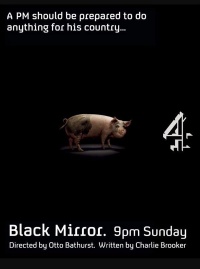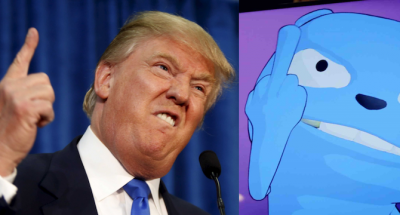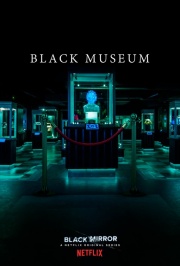Difference between revisions of "Black Mirror"
| Line 24: | Line 24: | ||
= Series 1 = | = Series 1 = | ||
[[File: Szn1promotion.jpg|200px|left|thumbnail|Promotional poster for The National Anthem]] | [[File: Szn1promotion.jpg|200px|left|thumbnail|Promotional poster for The National Anthem]] | ||
| − | Series 1 released in 2011 and contains three episodes. Episode 1 of Series 1, The National Anthem, first aired on Channel 4 December 4th, 2011. <ref>“The National Anthem (Black Mirror).” [https://en.wikipedia.org/wiki/The_National_Anthem_(Black_Mirror)] Wikipedia Foundation, 28 Mar. 2018</ref> It was critically acclaimed, receiving an A rating from the A.V. Club. <ref>Sims, David. “Black Mirror: The National Anthem” [https://tv.avclub.com/black-mirror-the-national-anthem-1798178649] TV Club, 13 Nov. 2013</ref> It depicts a scenario in which a prime minister must engage in broadcasted bestiality with a pig in order to save a member of the royal family. The episode paralleled allegations in 2015 that UK prime minister David Cameron placed "“a private part of his anatomy” into a dead pig’s mouth.”<ref> James Slack, Home Affairs Editor for the Daily Mail. “Revenge! Drugs, Debauchery and the Book That Lays Dave Bare: How PM's Snub to Billionaire Who Funded the Tories for Years Sparked the Most Explosive Political Book of the Decade.” [http://www.dailymail.co.uk/news/article-3242494/Revenge-PM-s-snub-billionaire-funded-Tories-years-sparked-explosive-political-book-decade.html] Daily Mail Online, Associated Newspapers, 21 Sept. 2015</ref> Subsequent episodes contend with materialism and exploitation of human labor in a technologically-advanced world, as well as alienation, and technology that consistently requires personal data to be handed over. Episode 2, "Fifteen Million Merits", depicts a world where the lives of working class people consist of riding a stationary bike in order to earn "merits" that are redeemable for various goods. The main characters work together to earn enough merits to appear on a talent show in an attempt to escape the slave like lifestyle they currently endure, only to come to the realization that their society is artificial and materialistic. Episode 3, "The Entire History of You", depicts the pitfalls of a world where memories are readily available, and the increased societal reliance on technology to shape reactions and behaviors in personal relationships. <ref> Brooker, Charlie. “Black Mirror.” [https://www.netflix.com/title/70264888] Netflix Official Site, 25 Dec. 2015 </ref> | + | Series 1 released in 2011 and contains three episodes. Episode 1 of Series 1, The National Anthem, first aired on Channel 4 December 4th, 2011. <ref>“The National Anthem (Black Mirror).” [https://en.wikipedia.org/wiki/The_National_Anthem_(Black_Mirror)] Wikipedia Foundation, 28 Mar. 2018</ref> It was critically acclaimed, receiving an A rating from the A.V. Club. <ref>Sims, David. “Black Mirror: The National Anthem” [https://tv.avclub.com/black-mirror-the-national-anthem-1798178649] TV Club, 13 Nov. 2013</ref> It depicts a scenario in which a prime minister must engage in broadcasted bestiality with a pig in order to save a member of the royal family. The episode paralleled allegations in 2015 that UK prime minister David Cameron placed "“a private part of his anatomy” into a dead pig’s mouth.”<ref> James Slack, Home Affairs Editor for the Daily Mail. “Revenge! Drugs, Debauchery and the Book That Lays Dave Bare: How PM's Snub to Billionaire Who Funded the Tories for Years Sparked the Most Explosive Political Book of the Decade.” [http://www.dailymail.co.uk/news/article-3242494/Revenge-PM-s-snub-billionaire-funded-Tories-years-sparked-explosive-political-book-decade.html] Daily Mail Online, Associated Newspapers, 21 Sept. 2015</ref> Subsequent episodes contend with materialism and exploitation of human labor in a technologically-advanced world, as well as alienation, and technology that consistently requires personal data to be handed over. Episode 2, "Fifteen Million Merits", depicts a world where the lives of working-class people consist of riding a stationary bike in order to earn "merits" that are redeemable for various goods. The main characters work together to earn enough merits to appear on a talent show in an attempt to escape the slave like lifestyle they currently endure, only to come to the realization that their society is artificial and materialistic. Episode 3, "The Entire History of You", depicts the pitfalls of a world where memories are readily available, and the increased societal reliance on technology to shape reactions and behaviors in personal relationships. <ref> Brooker, Charlie. “Black Mirror.” [https://www.netflix.com/title/70264888] Netflix Official Site, 25 Dec. 2015 </ref> |
= Series 2 = | = Series 2 = | ||
[[File: waldotrump.png|400px|right|thumbnail|Series 2 Episode 3's Waldo being likened to Donald Trump]] | [[File: waldotrump.png|400px|right|thumbnail|Series 2 Episode 3's Waldo being likened to Donald Trump]] | ||
Series 2 of Black Mirror first aired in February 2013 <ref>“Black Mirror.” [https://en.wikipedia.org/wiki/Black_Mirror] Wikipedia, 28 Mar. 2018</ref> | Series 2 of Black Mirror first aired in February 2013 <ref>“Black Mirror.” [https://en.wikipedia.org/wiki/Black_Mirror] Wikipedia, 28 Mar. 2018</ref> | ||
| − | and contained four episodes, with episode 1 (Be Right Back) depicting a service by which users stay in touch with loved ones after they die, raising questions about the recreation and preservation of identity through technology. Episode 3, The Waldo Moment, tells of a satirical cartoon figure that gains popularity through its brash humor | + | and contained four episodes, with episode 1 (Be Right Back) depicting a service by which users stay in touch with loved ones after they die, raising questions about the recreation and preservation of identity through technology. Episode 3, The Waldo Moment, tells of a satirical cartoon figure that gains popularity through its brash humor and ends up gaining a surprising amount of ground in a governmental election. The episodes touch on the larger impact of internet exchanges on political discourse, and the mixing of modern rhetoric with traditional political ides. It was likened to the 2016 American Presidential election, with some claiming that President Donald Trump carried a similar troll-like character to the cartoon entity Waldo depicted in the episode.<ref> “Black Mirror: The Unexpected Foresight of The Waldo Moment.” [http://www.denofgeek.com/us/tv/black-mirror/261620/black-mirror-the-unexpected-foresight-of-the-waldo-moment] Den of Geek, 5 Jan. 2018</ref>The series also explores developing identities with online assistance, extracting human intelligence and putting it to use, as well as widespread content blocking across one’s personal environment. |
| Line 40: | Line 40: | ||
[[File: Blackmuseum.jpg|180px|right|thumbnail|An advert for the series finale of series 4]] | [[File: Blackmuseum.jpg|180px|right|thumbnail|An advert for the series finale of series 4]] | ||
| − | The latest series of Black Mirror, released on December 29th, 2017, also contains six episodes like the preceding series.<ref>“The National Anthem (Black Mirror).” [https://en.wikipedia.org/wiki/The_National_Anthem_(Black_Mirror)] Wikipedia, Wikimedia Foundation, 28 Mar. 2018</ref> The first episode, USS Callister, is largely set in a Star-Trek like simulated reality that is used as a sandbox for a sadistic technology executive, alluding to the issues presented with simulating alternate realities online, and the depth of what it means to have consciousness and existence within virtual spaces. Episode two, Arkangel, concerns parenting and the liquid surveillance enabled by modern technology, theorizing the conflicts that occurs when parents can indulge in the act of tracking their child’s every move. Episode three is similar to The Entire History of You in Series 1, and touches on the consequences of a world where information is consistently available to be hijacked and used to manipulate others. Episode 4, titled Hang the DJ, showcases the idea of virtual simulation, through the use of trial relationships given to people by a digital companion named Coach. Episode 5, Metalhead, explores the issues of technology in surveillance, and what occurs when we put artificial agents with unknown reasoning patterns in charge of administering discipline. Episode 6, Black Museum, is an amalgamation of other themes from all other episodes, referencing the continual consequences of companies and other corporate entities developing new technologies at the expense of the exploitation of those willing to test it.<ref> Brooker, Charlie. “Black Mirror.”[https://www.netflix.com/title/70264888] Netflix Official Site, 25 Dec. 2015 </ref> | + | The latest series of Black Mirror, released on December 29th, 2017, also contains six episodes like the preceding series.<ref>“The National Anthem (Black Mirror).” [https://en.wikipedia.org/wiki/The_National_Anthem_(Black_Mirror)] Wikipedia, Wikimedia Foundation, 28 Mar. 2018</ref> The first episode, USS Callister, is largely set in a Star-Trek-like simulated reality that is used as a sandbox for a sadistic technology executive, alluding to the issues presented with simulating alternate realities online, and the depth of what it means to have consciousness and existence within virtual spaces. Episode two, Arkangel, concerns parenting and the liquid surveillance enabled by modern technology, theorizing the conflicts that occurs when parents can indulge in the act of tracking their child’s every move. Episode three is similar to The Entire History of You in Series 1, and touches on the consequences of a world where information is consistently available to be hijacked and used to manipulate others. Episode 4, titled Hang the DJ, showcases the idea of virtual simulation, through the use of trial relationships given to people by a digital companion named Coach. Episode 5, Metalhead, explores the issues of technology in surveillance, and what occurs when we put artificial agents with unknown reasoning patterns in charge of administering discipline. Episode 6, Black Museum, is an amalgamation of other themes from all other episodes, referencing the continual consequences of companies and other corporate entities developing new technologies at the expense of the exploitation of those willing to test it.<ref> Brooker, Charlie. “Black Mirror.”[https://www.netflix.com/title/70264888] Netflix Official Site, 25 Dec. 2015 </ref> |
| Line 50: | Line 50: | ||
===Channel 4 vs. Netflix=== | ===Channel 4 vs. Netflix=== | ||
| − | The first two seasons on Channel 4 center around the tensions that arise between technological progress and human nature, how solutions to real problems can be perverted by society. This is exemplified in the episode “Be Right Back,” where a woman loses her husband | + | The first two seasons on Channel 4 center around the tensions that arise between technological progress and human nature, how solutions to real problems can be perverted by society. This is exemplified in the episode “Be Right Back,” where a woman loses her husband in a car crash, only to replace him with a robot facsimile created from his social media data. This episode explores a problem of, losing a loved one. A solution appears but the cracks start to show, possibly causing more emotional damage to the protagonist than just losing her husband. In the episode “The Entire History of You,” the issue of poor memory recollection is solved by “the grain,” a small implant that records everything a person sees. This allows the government in the episode to even more easily spy on their citizens and enables the protagonist to discover that his wife is cheating on him and that his daughter is not actually his. The first two seasons of Black Mirror are about the cost of progress. |
The message shifts in the later two seasons when the show was bought by Netflix. The challenging, thought-provoking questions from the original seasons are gone, replaced by scenarios and plots that make viewers scared of their cell phone. This is exemplified in the episode “Playtest,” where a man agrees to test an experimental video game that ends up killing him. The issue with this episode is that it has little to say outside belittling any new technology. An ultra-realistic game is not a solution to any of society current issues. The same could be said of the episode “Nosedive” where a woman chases social media validation to her own detriment. There is no overarching message to this episode other than to not place your validation in social media. Once again, there is no solution to a real problem and thus the episode does not say anything meaningful about human nature. The show was once about making viewers think, now it is about making people scared of technology. | The message shifts in the later two seasons when the show was bought by Netflix. The challenging, thought-provoking questions from the original seasons are gone, replaced by scenarios and plots that make viewers scared of their cell phone. This is exemplified in the episode “Playtest,” where a man agrees to test an experimental video game that ends up killing him. The issue with this episode is that it has little to say outside belittling any new technology. An ultra-realistic game is not a solution to any of society current issues. The same could be said of the episode “Nosedive” where a woman chases social media validation to her own detriment. There is no overarching message to this episode other than to not place your validation in social media. Once again, there is no solution to a real problem and thus the episode does not say anything meaningful about human nature. The show was once about making viewers think, now it is about making people scared of technology. | ||
Revision as of 14:49, 17 April 2018
|
Black Mirror is a British science fiction television series that was written by Charlie Booker and Annabel Jones. The series has received global recognition, particularly in the United States after it was purchased by and made available on Netflix. Black Mirror explores the potential consequences of advances in technology, generally presenting a dystopian outlook with social commentary.
The series’ episodes are anthological with each episode containing a different narrative and set of characters. Each episode centers around a new concept or sociotechnical advancement. The name “Black Mirror” refers to the reflection visible from a screen when its backlight is off. [1]There are 19 total episodes of the show spread between four series. Series 1 and 2 appeared on British television station Channel 4 in 2011 and 2013, and were then added to Netflix in 2014. In 2015, Netflix purchased the series, commissioning two more series that were released in 2015 and 2017, respectively. Black Mirror was renewed for a fifth series in March of 2018. Black Mirror has won multiple Emmy awards and other accolades.[2]
Contents
Series 1
Series 1 released in 2011 and contains three episodes. Episode 1 of Series 1, The National Anthem, first aired on Channel 4 December 4th, 2011. [3] It was critically acclaimed, receiving an A rating from the A.V. Club. [4] It depicts a scenario in which a prime minister must engage in broadcasted bestiality with a pig in order to save a member of the royal family. The episode paralleled allegations in 2015 that UK prime minister David Cameron placed "“a private part of his anatomy” into a dead pig’s mouth.”[5] Subsequent episodes contend with materialism and exploitation of human labor in a technologically-advanced world, as well as alienation, and technology that consistently requires personal data to be handed over. Episode 2, "Fifteen Million Merits", depicts a world where the lives of working-class people consist of riding a stationary bike in order to earn "merits" that are redeemable for various goods. The main characters work together to earn enough merits to appear on a talent show in an attempt to escape the slave like lifestyle they currently endure, only to come to the realization that their society is artificial and materialistic. Episode 3, "The Entire History of You", depicts the pitfalls of a world where memories are readily available, and the increased societal reliance on technology to shape reactions and behaviors in personal relationships. [6]
Series 2
Series 2 of Black Mirror first aired in February 2013 [7] and contained four episodes, with episode 1 (Be Right Back) depicting a service by which users stay in touch with loved ones after they die, raising questions about the recreation and preservation of identity through technology. Episode 3, The Waldo Moment, tells of a satirical cartoon figure that gains popularity through its brash humor and ends up gaining a surprising amount of ground in a governmental election. The episodes touch on the larger impact of internet exchanges on political discourse, and the mixing of modern rhetoric with traditional political ides. It was likened to the 2016 American Presidential election, with some claiming that President Donald Trump carried a similar troll-like character to the cartoon entity Waldo depicted in the episode.[8]The series also explores developing identities with online assistance, extracting human intelligence and putting it to use, as well as widespread content blocking across one’s personal environment.
Series 3
Series 3, released in October 2016, and was the first series released under Netflix ownership. It contains six episodes that capture many of the burgeoning concerns about the proliferation of technology. Episode 1, Nosedive, alludes to the everyday effects of being absorbed in public feedback and curating a polished identity on social media while struggling to build a notable network. It also portrays a world where clout is capable of directly determining one’s social standing, as well as what they’re able to consume, where they can live, and how they travel. Episode 2, Playtest, captures the haphazard approach of Tech Companies to implement and test new technologies, and the way profound new devices with life-changing effects are being tested on human subjects with little to no ethical consideration. Episode 4, San Junipero, won a Primetime Emmy award for the show [9], telling of a love story that lives forever in an online platform hosting artificial consciousness. It alludes to technology as a divine figure and the ramifications of simulating life and consciousness.[10]
Series 4
The latest series of Black Mirror, released on December 29th, 2017, also contains six episodes like the preceding series.[11] The first episode, USS Callister, is largely set in a Star-Trek-like simulated reality that is used as a sandbox for a sadistic technology executive, alluding to the issues presented with simulating alternate realities online, and the depth of what it means to have consciousness and existence within virtual spaces. Episode two, Arkangel, concerns parenting and the liquid surveillance enabled by modern technology, theorizing the conflicts that occurs when parents can indulge in the act of tracking their child’s every move. Episode three is similar to The Entire History of You in Series 1, and touches on the consequences of a world where information is consistently available to be hijacked and used to manipulate others. Episode 4, titled Hang the DJ, showcases the idea of virtual simulation, through the use of trial relationships given to people by a digital companion named Coach. Episode 5, Metalhead, explores the issues of technology in surveillance, and what occurs when we put artificial agents with unknown reasoning patterns in charge of administering discipline. Episode 6, Black Museum, is an amalgamation of other themes from all other episodes, referencing the continual consequences of companies and other corporate entities developing new technologies at the expense of the exploitation of those willing to test it.[12]
Criticism and Parallels
Critics are concerned that the show is overly disdainful of the onset of modern technologies in society—Journalist Fran Sign posited that watching Black Mirror was predicated on “mocking the subjects, foolishly thinking we are in some way above it.”[13]In a Vulture article, Kathryn VanArendonk explains how while she thinks Booker’s plotlines are impressive, they too often rely on the simple crutch of making blanket statements about how “everything is bad,” and that it “relies on the illusion of depth.” [14] The TV series focuses on the negative aspects of technology, causing many to feel uncomfortable about the increase in technology. To date, very few episodes have shown the positives of new technology and the future.
With this criticism in mind, writers and producers Charlie Booker and Annabel Jones say they’re not aiming to predict the future or cast a depressingly dystopian shadow on the future of technology. Their ideas come out of whimsical “What if?” Scenarios.[15]With this in mind, the show has been credited for its uncanny parallels to a wide variety of current events related to technology. China’s system of social credit scores was thought to pose resemblance to Series 3’s Nosedive, and Pizza Hut's release of an automated pizza delivery vehicle was likened to Series 4’s Crocodile. [16]
Channel 4 vs. Netflix
The first two seasons on Channel 4 center around the tensions that arise between technological progress and human nature, how solutions to real problems can be perverted by society. This is exemplified in the episode “Be Right Back,” where a woman loses her husband in a car crash, only to replace him with a robot facsimile created from his social media data. This episode explores a problem of, losing a loved one. A solution appears but the cracks start to show, possibly causing more emotional damage to the protagonist than just losing her husband. In the episode “The Entire History of You,” the issue of poor memory recollection is solved by “the grain,” a small implant that records everything a person sees. This allows the government in the episode to even more easily spy on their citizens and enables the protagonist to discover that his wife is cheating on him and that his daughter is not actually his. The first two seasons of Black Mirror are about the cost of progress.
The message shifts in the later two seasons when the show was bought by Netflix. The challenging, thought-provoking questions from the original seasons are gone, replaced by scenarios and plots that make viewers scared of their cell phone. This is exemplified in the episode “Playtest,” where a man agrees to test an experimental video game that ends up killing him. The issue with this episode is that it has little to say outside belittling any new technology. An ultra-realistic game is not a solution to any of society current issues. The same could be said of the episode “Nosedive” where a woman chases social media validation to her own detriment. There is no overarching message to this episode other than to not place your validation in social media. Once again, there is no solution to a real problem and thus the episode does not say anything meaningful about human nature. The show was once about making viewers think, now it is about making people scared of technology.
References
- ↑ McGarrigle, Lia. “Here's What the Title of 'Black Mirror' Really Means.” [1] Highsnobiety, 28 Mar. 2018
- ↑ “Black Mirror.” [2] Wikipedia, Wikimedia Foundation, 28 Mar. 2018
- ↑ “The National Anthem (Black Mirror).” [3] Wikipedia Foundation, 28 Mar. 2018
- ↑ Sims, David. “Black Mirror: The National Anthem” [4] TV Club, 13 Nov. 2013
- ↑ James Slack, Home Affairs Editor for the Daily Mail. “Revenge! Drugs, Debauchery and the Book That Lays Dave Bare: How PM's Snub to Billionaire Who Funded the Tories for Years Sparked the Most Explosive Political Book of the Decade.” [5] Daily Mail Online, Associated Newspapers, 21 Sept. 2015
- ↑ Brooker, Charlie. “Black Mirror.” [6] Netflix Official Site, 25 Dec. 2015
- ↑ “Black Mirror.” [7] Wikipedia, 28 Mar. 2018
- ↑ “Black Mirror: The Unexpected Foresight of The Waldo Moment.” [8] Den of Geek, 5 Jan. 2018
- ↑ Tiffany, Kaitlyn. “Netflix's Black Mirror Wins Emmy for Outstanding Writing for a Limited Series.” [9] The Verge, The Verge, 18 Sept. 2017
- ↑ Brooker, Charlie. “Black Mirror.” [10] Netflix Official Site, 25 Dec. 2015
- ↑ “The National Anthem (Black Mirror).” [11] Wikipedia, Wikimedia Foundation, 28 Mar. 2018
- ↑ Brooker, Charlie. “Black Mirror.”[12] Netflix Official Site, 25 Dec. 2015
- ↑ Singh, Fran. “Black Mirror: Brooker's Disdain for Absolutely Everything Is Wearing Thin.” [13] HuffPost UK, 4 Feb. 2012
- ↑ VanArendonk, Kathryn. “The Case Against Black Mirror.” Vulture
- ↑ CHARLIE BROOKER REFLECTS ON BLACK MIRROR'S DARK VISIONS: Black Mirror taps into the future - or at least what it could look like. But co-creators Charlie Brooker and Annabel Jones tell Gemma Dunn their hit show is more about homing in on the world's collective sense of unease ON THE SCREEN SMALL. (2017). Nottingham Evening Post. http://dx.doi.org/1982491535
- ↑ White, Catriona. “A Driverless Pizza Van Is the Latest Black Mirror Prediction to Come True.” BBC News, 10 Jan. 2018





